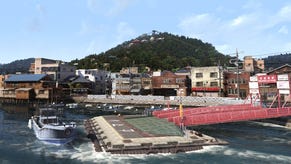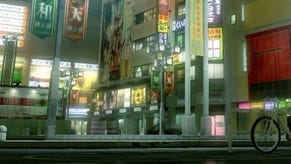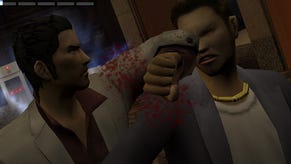Yakuza
Worth a finger or two.
Next to the massed ranks of cinematic mafioso and triads, the yakuza are a bit of a mystery. Of course we all know about the snakeskin shoes and severed fingers (interesting fact: it used to be about weakening the sword grip), and some of us know about tattoos creeping above shirt collars, and the familial relationships that underpin the organisation. But next to the mafia, which Mario Puzo really did a number on, we're still waiting for Hollywood to catch us up. How many knew that yakuza families aren't actually secret organisations, for example, and actually have buildings sitting right there on the street bearing their name?
With no yak Tony Soprano to instruct us, then, SEGA's hoping to fill the void with its latest PlayStation 2 game, which charts the career of the relatively honourable Kazuma Kiryu - "the Dragon of the Dojima family" and the face behind the boot you get up your backside when you don't settle your debts. Despite all the violence, Kazuma is quite a personable bloke, whose love for his friends sees him banged up for ten years over a murder his "brother" Nishiki committed, out of his desire not to separate his young friend from his dying sister. Aw. Fast forward to the present day, by way of a few scene-setting punch-ups, and Kazuma's thrust back onto the streets and into a tale of a murdered yakuza chairman and the loss of 10 billion yen from the organisation's bank account.
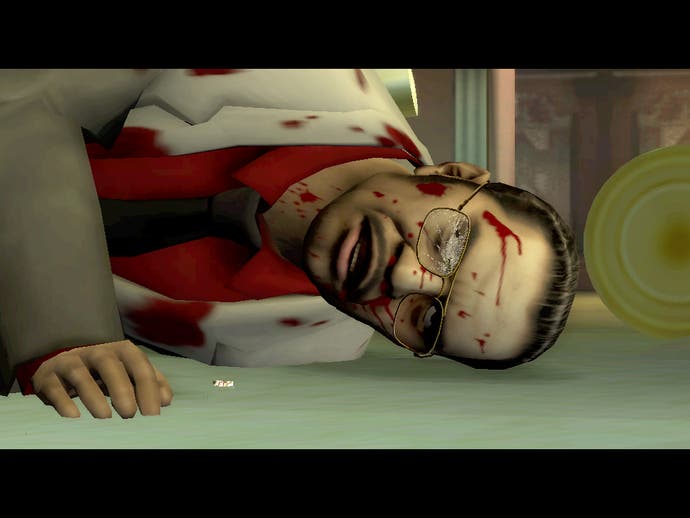
Naturally the game wouldn't be all that interesting if Kazuma was a simple thug, but SEGA has an answer to that: Kazuma's always in the wrong place at the wrong time. Not only that, but the wrong place seems to follow him around. I've been to Japan, and I didn't get in any fights. Kazuma, on the other hand, can't walk more than half a block without somebody starting on him. Whether it's because he's a yak, because he's bumped into them, because they want him to pay some money, or because - you rather suspect - the developer's borrowed the random battles idea from the Japanese RPG genre, Kazuma's a target for lots of intimidation - and he doesn't take kindly to it. Nor does his boot.
Yakuza borrows liberally from other sources too, but never becomes overly complicated in gameplay terms. From games like Resident Evil it takes a limited inventory, storage lockers for depositing items, and the ability to save your game whenever you find a telephone (thankfully, unlike Resi's ink ribbons, you don't need to stock up on anything special to do so), but puzzles are kept to a minimum. The threads of the story, which involves a great number of characters - a down-on-his-luck policeman, a little girl who needs protecting, an informant and a host of criminal and semi-legitimate businessmen - twist and turn through the shadows and specular lighting effects of the Japanese criminal underworld, with plenty of arcs to explore outside the main narrative, but for the most part Yakuza's about moving between cut-scene locations and getting into lots and lots of fights. Through all of this you'll have plenty of time to get to grips with the hand-to-hand violence, and the experience and health systems that underwrite it.
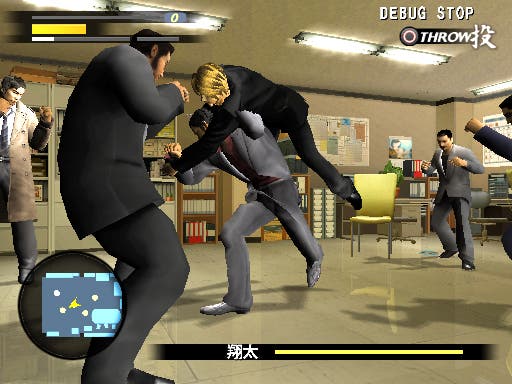
Thrown into a battle, Kazuma and his enemy (or enemies, most likely) roam around a small arena pumping each other with punches and kicks. Initially it's standard two- or three-hit attacks thrown with combinations of square and triangle, with a bit of grappling and throwing via the circle button, but that quickly improves as you master strafing, dodging, blocking, and Kazuma's fired-up "heat moves", which can be used once he's built up a meter in the top-left of the screen by working through his basic repertoire. Heat moves are a lot more violent - like smashing a crim's head into a desk - and deal a lot more damage. You can also pick up objects lying around, like golf clubs, bicycles, paper lanterns and whatnot. It's not quite Dead Rising, but there is room for invention, and the combat sequences - animation and collision detection in particular - are extremely solid.
As experience builds up through exploration and fights won, Kazuma can also invest in three areas - body, technique and soul - and unlock new moves and counters, which are rarely that complicated. Like the story, all of this neatly comes to full bloom by the end of the game's healthy run-time, when all of the various techniques you might need are unlocked. Playing on normal difficulty you'll find some enemies a bit wilier than others - bosses in particular - but you should be able to stay ahead of the difficulty curve by investing your experience and keeping a good stock of health items in your inventory, bought from shops and accessible from your limited inventory slots even during battle. It's not the sort of combat game that leaves you bristling with frustration at the injustice of it.
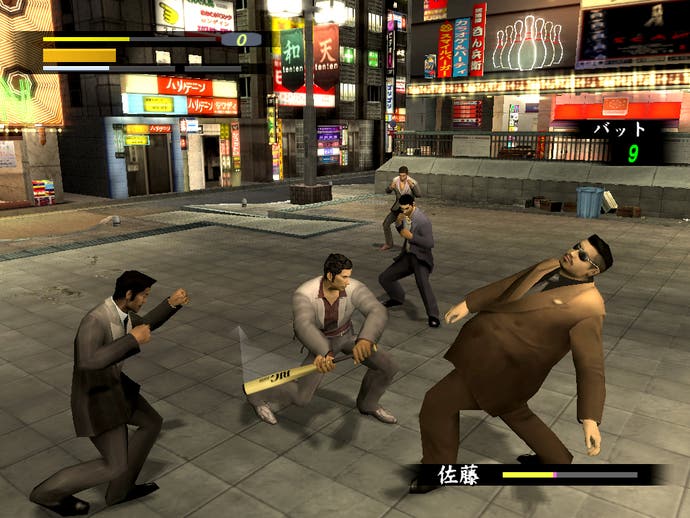
Beyond the combat, Yakuza allows you to explore the city and eke out your own entertainment, although it's by no means as versatile as something like Grand Theft Auto. For a start, the play-area is relatively small, with vehicles unavailable. Even so, there are quite a few places to go to occupy yourself - pachinko and massage parlors, arcades with UFO catchers, casinos, a batting cage, and even the option to try and woo the occasional lady. None of it's all that developed - and unlike Gangs of London it's not the sort of game where you're likely to find more fun in the mini-games than the core campaign - but there are also side-quests to tackle, and it's certainly possible to lose yourself in the atmosphere of the world if you're not bothered about observing the apparent pace of the narrative, and you'd rather just talk to everyone and splash your cash around.
Initially you get the feeling that you won't be bothering. The story's the source of your impetus and the pace and grandeur seem at odds with the varnish of incidentals, so while the colourful streets are brimming with people - many of whom have stories to tell or information to sell - it's hard to escape into the fantasy as fully as you can with the satire of Dead Rising or the wantonness of Grand Theft Auto - where variation and time-wasting make sense - or even the variety and scope of SEGA's own Shenmue series. It doesn't help that the English dub - evident in cut-scenes - does scant justice to the epic reels of in-engine cut-scenes that are clearly still synched to the Japanese dialogue, nor that load-times for the random battles and scene transitions are a bit lengthy.
Given a bit of time though, Yakuza's solid combat and ambitious plotting pay out, as quirks like squirming analogue movement and some camera problems become less noticeable and what feels like repetition in combat gives way to appreciation of the satisfyingly meaty animations, and interest in the whereabouts of Yumi, the decline of Nishiki, the price that Kazuma's friends are made to pay for their relationship, and ultimately how Kazuma's going to sort everything out. It can be a bit clichéd, and you wouldn't mention it in the same breath as something like Deus Ex or Planescape Torment, but, a relative lack of puzzles aside, a comparison with fellow Japanese action games like Onimusha wouldn't be unfair - and it's certainly a game I felt like seeing through to the end. Definitely more than the sum of its parts, and a rare case of a game getting there before Hollywood.



